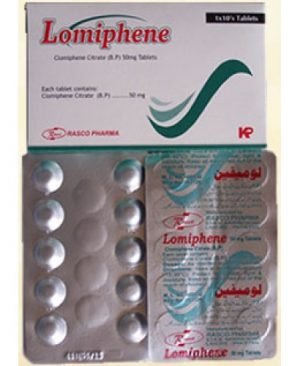Clomid (Clomiphene Citrate) 50mg
$2.20 $1.70
Clomid (Clomiphene Citrate) 50mg pills/tablets:
Clomid (Clomiphene Citrate) treats ovulation problems in women who want to become pregnant.
You can buy Clomid (Clomiphene Citrate) 50mg tablets online without prescription (No RX) .
product price is as: per pill
Minimum order quantity is: 100 pills
What is clomiphene?
Clomiphene is a non-steroidal fertility medicine. It causes the pituitary gland to release hormones needed to stimulate ovulation (the release of an egg from the ovary).
Clomiphene is used to cause ovulation in women with certain medical conditions (such as polycystic ovary syndrome) that prevent naturally occurring ovulation.
Clomiphene may also be used for purposes not listed in this medication guide.
Important information
Do not use clomiphene if you are already pregnant.
You should not use clomiphene if you have: liver disease, unexplained abnormal vaginal bleeding, an uncontrolled adrenal gland or thyroid disorder, an ovarian cyst (unrelated to polycystic ovary syndrome), or if you are pregnant.
Before taking this medicine
You should not use clomiphene if you are allergic to it, or if you have:
- unexplained abnormal vaginal bleeding;
- an ovarian cyst that is not related to polycystic ovary syndrome;
- past or present liver disease;
- a pituitary gland or other brain tumor;
- an untreated or uncontrolled problem with your thyroid or adrenal gland; or
- if you are pregnant.
To make sure clomiphene is safe for you, tell your doctor if you have:
- endometriosis or uterine fibroids.
Do not use clomiphene if you are already pregnant. Talk to your doctor if you have concerns about the possible effects of this medicine on a new pregnancy.
Clomiphene can pass into breast milk and may harm a nursing baby. This medication may slow breast milk production in some women. Tell your doctor if you are breast-feeding a baby.
Using clomiphene for longer than 3 treatment cycles may increase your risk of developing an ovarian tumor. Ask your doctor about your specific risk.
Higher doses of clomiphene can also lead to visual disturbances, which may be irreversible, or a condition called ovarian hyperstimulation syndrome (OHSS). OHSS can be a life threatening condition. Symptoms include abdominal pain, bloating, nausea, weight gain, and trouble breathing.
Fertility treatment may increase your chance of having multiple births (twins, triplets). These are high-risk pregnancies both for the mother and the babies. Ask your doctor about this risk.
How should I take clomiphene?
Use clomiphene exactly as directed by your doctor. Follow all directions on your prescription label. Your doctor may occasionally change your dose to make sure you get the best results. Do not take this medicine in larger or smaller amounts or for longer than recommended.
Reviews
There are no reviews yet.












Be the first to review “Clomid (Clomiphene Citrate) 50mg”